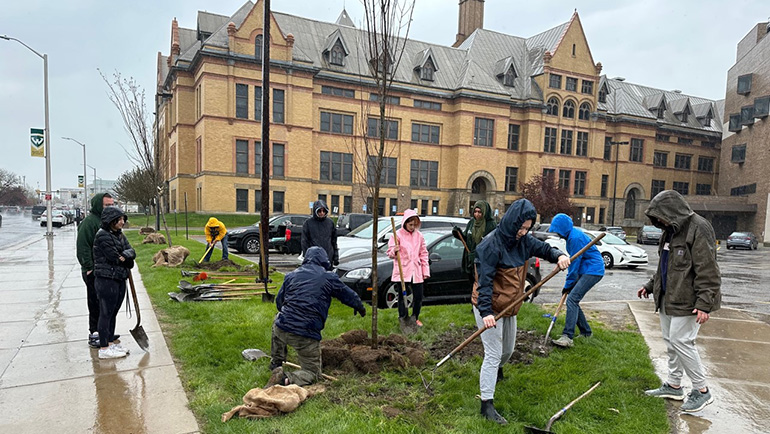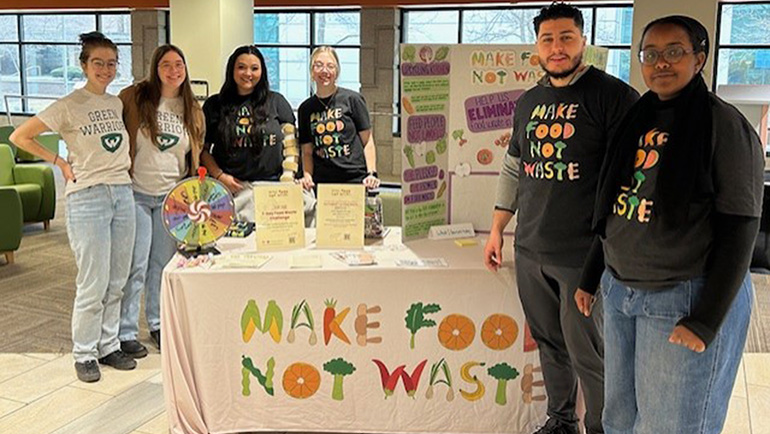
DETROIT – Wayne State University, a top tier urban public research university, is an incubator for solutions and small changes that positively impact metro Detroit and the world by reducing its carbon footprint.
Sustainability leaders like Donna Kashian, Ph.D., a professor of biology and director of environmental science in the College of Liberal Arts and Sciences, are transforming Wayne State into a non-carbon institution that will benefit future students and stakeholders.
“Sustainability touches everything,” Kashian said. “All of us do it because we know it’s the right thing to do to help make the world a better place.”
Kashian is the founder of T-RUST – Transformative Research in Urban Sustainability Training – the precursor to the United Nations Regional Centre of Expertise on Education for Sustainable Development (UN-RCE), a binational joint venture between Wayne State and the University of Windsor.
UN-RCE promises to draw upon the legacy of T-RUST and pave a brighter, sustainable future for communities on both sides of the international border by aiming to address climate change, economic disparities, health inequities and more.
“We are going to be pushing for a lot more visibility on campus, creating more programs,” said Kashian, who was named UN-RCE director in August. “I would like to sit down with every department chair and talk about sustainability in their courses. Sometimes, people don't realize their modules actually touch on sustainability. They think of sustainability kind of in a very narrow way, but it’s a very broad thing. We’re going to try and start identifying where all the sustainability efforts, grants and student interests are on campus.”

Sustainability in general, as well as on the Midtown campus, can have a great impact on climate change and the ability to thrive over time while empowering community health. Real and measurable effects on such things as decreased food supply, increased costs, drought, forest fires, diseases and extreme weather conditions can all be attributed to sustainability.
Kashian, the incoming president of the International Association of Great Lakes Research, also helped increase local sustainability efforts through projects like the bioswale stormwater runoff structures built on Wayne State’s campus. Kashian’s lab is also studying how microplastics impact harmful algal bloom behavior, animals’ gills, fish diets and more.
As the world celebrates April as Earth Month, Kashian is proud of the university and its research strengths to lift sustainability efforts. She points to the work of others, like civil and environmental engineering professors Carol Miller, who is teaching students via water testing and addressing PFAS, and Bill Schuster, who is working with Detroit residents to write new waterway plans for flood-prone neighborhoods on the city’s east side. The efforts of both professors are supported by the Fred A. and Barbara M. Erb Family Foundation.
“You can’t ignore the students who are hugely committed, the Green Warriors and the interns working in the facilities office,” said Kashian, who was named one of the 2024 Crain’s Detroit Business Notable Leaders in Sustainability. “We’re all coming at it from different angles, which is super important because it covers more of the gap that’s out there.
“I’m super proud of all of them – students, facility and staff.”
As a top tier urban public research university, Wayne State is committed to innovation in addressing the challenges posed to urban communities, including climate care and environmental stewardship. The work that begins in Detroit can serve as a model for other communities.
“Michigan has so many environmental assets, and our faculty’s research in sustainability is a critical issue of our time,” said President Kimberly Andrews Espy, Ph.D. “Through rigorous, impactful research, we can create and bring to market solutions that create vibrant, healthier and more prosperous cities in our region and beyond.”
